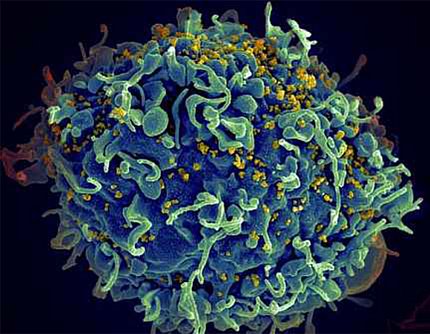Experimental HIV Vaccine Shows Promise

Photo: Seth Pincus, Elizabeth Fischer and Austin Athman, NIAID
A team led by NIAID’s Dr. Paolo Lusso developed and tested an mRNA HIV vaccine in animals. Study results were published in Nature Medicine.
Messenger RNA, or mRNA, is a molecule that instructs the body to make proteins. mRNA vaccines teach cells to make proteins from a virus or other microbe, which then trigger the body’s immune response, protecting the body from infection if the real virus enters.
The first two mRNA vaccines available to the public are Covid-19 vaccines, but researchers have studied mRNA technology for other uses for decades.
The experimental HIV vaccine is injected into muscle, where it instructs the body to make two key HIV proteins, Env and Gag. Muscle cells assemble these two proteins into virus-like particles studded with many copies of Env on their surface. These virus-like particles cannot cause infection or disease because they lack the complete genetic code of HIV. Yet they provoke immune responses similar to natural HIV infection.
The researchers first tested the vaccine in mice. After two injections, it elicited antibodies in all animals that could neutralize HIV, producing a response that closely mimicked natural infection.
They then tested the vaccine in rhesus macaques. Monkeys received a priming vaccine followed by several booster inoculations. By week 58, all vaccinated macaques had developed measurable levels of antibodies that could neutralize many diverse HIV strains. The experimental vaccine also induced other important immune responses, like helper T cells, which aid other immune cells.
The macaques were then exposed weekly to simian-human HIV (SHIV), a form of the virus used for modeling human HIV in monkeys. Overall, vaccinated monkeys had a 79 percent lower per-exposure risk of SHIV infection than unvaccinated animals.
The vaccine course was well-tolerated with only mild side effects. These results showed that the novel HIV vaccine was safe and prompted immune responses against an HIV-like virus. The team plans to conduct a phase 1 trial of the mRNA HIV vaccine in healthy adult volunteers after further refinement and testing.—adapted from NIH Research Matters
